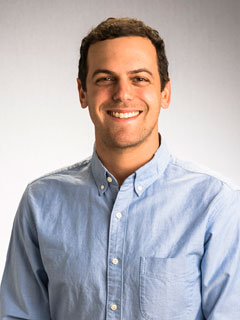Career Panel
Career Panel:

Evan Weber,PhD is an Assistant Professor of Pediatrics (Oncology) at UPenn earned he has a BS in the Program in the Environment from the University of Michigan in 2008 and received his PhD in Immunology from Northwestern University Feinberg School of Medicine in 2016. He then pursued postdoctoral training in CAR-T cell engineering at Stanford University School of Medicine. Currently, he is a leading researcher in CAR-T cell therapy, focusing on overcoming T cell exhaustion—a major barrier to treatment efficacy. His groundbreaking work has shown that transiently pausing CAR signaling restores anti-tumor functionality through epigenetic remodeling (Weber et al., Science, 2021). Building on this foundation, his lab uses pharmacologic, gene-editing, and bioengineering approaches to create exhaustion-resistant CAR-T cells. By linking epigenetic features to CAR-T cell function and patient outcomes, Dr. Weber aims to uncover molecular drivers of dysfunction and develop universal strategies to enhance CAR-T cell durability and efficacy in cancer treatment. As a career panelist, Dr. Weber brings a wealth of insights into academic career development, translational research, and the evolving landscape of cutting-edge cell therapy in pediatric oncology.
Lab: www.theweberlab.org
Email: weberew@chop.edu

Emily E. Bosco, PhD, is a senior leader in cell therapy and early oncology at AstraZeneca, where she serves as Senior Director in Cell Therapy within the Early Oncology division. Dr. Bosco earned her PhD in Cell and Molecular Biology from the University of Cincinnati (2002–2006), where her research focused on the role of the retinoblastoma tumor suppressor in mediating breast cancer responses to DNA-damaging therapies. She has made early-career contributions to hematology and cancer research, supported by NIH funding (K99/R00) and multiple patent filings. Over the past two decades, Dr. Bosco has built a distinguished career spanning basic cancer biology, translational immuno-oncology, and industrial drug development. At AstraZeneca and previously at MedImmune, she has led high-impact preclinical programs and cross-functional teams focused on biologics and immune-based cancer therapies. She is at the forefront of engineering next-generation immunotherapies, including chimeric antigen receptor (CAR) T cells and T-cell engagers. Her recent work includes leading and co-authoring key studies such as the development of AZD0754, an armored STEAP2-targeted CAR-T therapy designed to resist TGF-β–mediated immunosuppression in prostate cancer. Dr. Bosco’s depth of experience in tumor biology, biologics engineering, and translational medicine exemplifies the critical role of industry scientists in advancing innovative cancer therapeutics.
Email: emily.bosco@astrazeneca.com

Rongze Lu, PhD, is an Associate Professor in the Department of Neurological Surgery at the University of California, San Francisco (UCSF), and a Principal Investigator at the UCSF Brain Tumor Center. A proud alumna of the City of Hope Graduate School of Biological Sciences, Dr. Lu earned her PhD in Cancer Immunology before pursuing postdoctoral research at Genentech. Her career spans both academia and industry, with previous leadership roles at MedImmune/AstraZeneca and AbbVie. She later transitioned back to academia as a faculty member at UT Austin and subsequently joined UCSF, where she leads a research program dedicated to uncovering the molecular drivers of immune suppression in the brain tumor microenvironment, particularly in glioblastoma. Her lab investigates how protein phosphatase 2A (PP2A) modulates immune evasion by suppressing the activation of T cells, macrophages, and microglia. Her seminal work demonstrated that pharmacological inhibition of PP2A can synergize with PD‑1 checkpoint blockade and STING-type I interferon activation to restore anti-tumor immunity in resistant gliomas. These findings have translated into clinical application, sparking a Phase I/II clinical trial (NCT03027388) evaluating a PP2A inhibitor in patients with recurrent glioblastoma. Dr. Lu’s research has been recognized through numerous awards, including the Department of Defense Peer-Reviewed Cancer Research Program Career Development Award and the Keystone Symposia Early Career Investigator Award. She is also the recipient of NIH R01 and SPORE grants focused on targeting PP2A and modulating STING signaling in tumor-associated macrophages and microglia.
Lab: https://lulab.ucsf.edu/people/rongze-olivia-lu
email: lurongzerose@gmail.com

Graham Cole, Ph.D., J.D. is the Director of Intellectual Property at City of Hope, where he is part of the Office of Technology Licensing. He holds a Ph.D. in biomedical physics from UCLA, specializing in developing small molecule tracers for imaging estrogen sulfotransferase expression using positron emission tomography (PET). He also earned a J.D. from New York University School of Law. Before joining City of Hope, Graham practiced as an associate at Munger, Tolles & Olson LLP, focusing on life sciences patent litigation and counseling in biopharmaceuticals, biotechnology, and medical devices. He previously served on the board of the Los Angeles Intellectual Property Law Association, heading part of their in-house out-reach efforts. Graham comes to City of Hope, as many of us, with a family that has been significantly affected by cancer. He believes deeply in the mission of bringing new and innovative therapies to our patients and hopes that we all put ourselves out of a job one day. In his spare time, Graham enjoys spending time with his family and currently serves on the board of a non-profit feral kitten rescue located in south central Los Angeles.